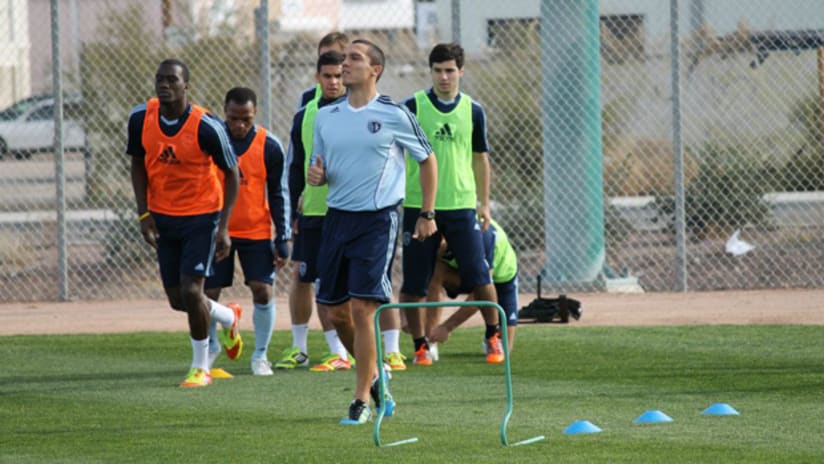Q: With Sporting KC essentially playing two games a week from mid-June to mid-August, what actions do you take as a fitness coach to make sure all players stay fully fit?
It comes down to a question of stress and recovery. When players play and train, they accumulate stress – physically and mentally. Our job is to manage their state of recovery during these busy months. We’re always monitoring how much playing time and training time they accumulate. The coaches do a good job of rotating players around and keeping guys fresh. With the guys that have continuous exposure—meaning they play 90 minutes twice a week—we have to monitor their fatigue levels, too. We have some systems in play where I can do physical analysis on guys and determine how fatigued they are. From there, we make decisions on whether to maybe rest them for a day or do a recovery session. Every player is looked at individually.
Q: How does training change during this busy period?
We take an individual approach to training. The guys who aren’t playing will be training throughout the week. The guys playing in games will be recovering between games. It comes down to the individual, and we have to make sure he is fresh every time he is called upon.
Q: How does travelling make things more difficult?
Travelling adds more stress. Whenever you’re traveling on the road, games are hard. The fans are against you, the pitch is against you, the environment is against you. You might be a Canadian team and travel down to Houston to play in 100-degree weather. There’s an entire array of factors against you. The question is this: are your guys physically and mentally prepared to handle that match?
Q: How do you monitor each player’s fitness levels?
We have some systems in place to monitor fatigue and training volume. All players wear heart rate monitors every day. I collect that data and I know exactly how much they exerted during that given session. This data shows each player’s cardiovascular load—when a player sprints a lot, his cardiovascular load will obviously increase, compared to someone who just jogs around the field. We always monitor that cardiovascular load throughout the season and try to decrease it and increase it at certain times so that players are always in optimal shape. The other important piece of the puzzle is selecting activities day-to-day so that the player is fresh and fit as possible before a match.
Q: How much of a role does communication between players and coaches play in deciding who is rested?
It’s huge. I’ll give my input regarding the physical status of players, and the coach will make a decision on game day. Sometimes I might tell the coach that certain players need time off, but at the end of the day it’s the coach’s decision. A lot of times decisions are made on a personal level. Technology can only tell me so much about a player’s fitness. If the data is telling me a guy is tired, but the player himself is telling me he’s ready to go, I’m going to take his decision. Coaches and players have to trust each other. For example, players can’t hide injuries. So I take personal conversations very seriously.
Q: Talk about the nutrition guidelines for players during this busy stretch in the calendar.
Much like training, our nutrition regimen is individually tailored. I talk to players individually about their diets and what their goal calorie intakes should be, and what their nutrients should be composed of. The big thing in the summer is hydration. We take extra care in hydrating the players. I always tell the guys they should never feel thirsty. They should always be drinking. We have meals available for them in the morning, and sometimes lunch, too. This is an education process. Once I teach players how to eat healthy, I don’t have to babysit them anymore. They have the tools to be successful.
Q: Is there any pattern to weekly training throughout the season?
We take a week-by-week approach with our training. We will have players getting hurt, coming back from injury, and players away on international duty. You can’t just try to plan a season’s worth of training. The training exercises must be adapted on a weekly basis. We don’t have a standard protocol from Monday to Friday. We select exercises for specific days that complement each other and have varying cardiovascular loads. No one week will be the same.
Q: How hard is it to keep players fresh during a 10-month season?
It’s very hard. You have to help these players physically and psychologically, and a lot of things are out of our (control). We educate players in terms of how to take care of their bodies in a way that makes them more productive year after year. But some players don’t have that level of professionalism. No matter what we do to help them, they’re only at training for a couple hours a day. They have 13 or 14 hours for the rest of the day where they could be doing something that could negatively impact them. Ultimately, we try to establish a training culture inside the club that transcends into their personal lives.




